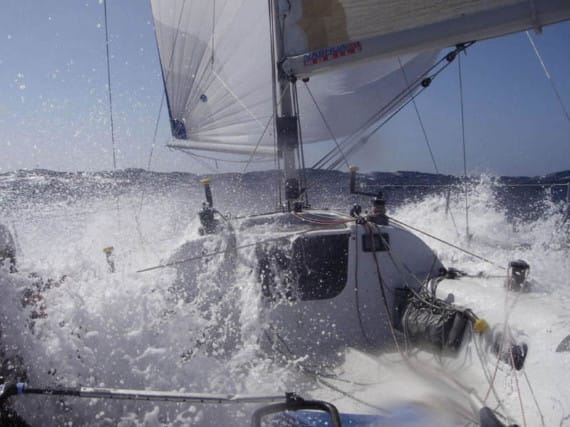Originally designed for watercraft, a composite material developed by the Scotland-based Ultimate Boat Company (UBC) could be a gamechanger in terms of both performance and sustainability for countless industries and applications, from wind power to yachting.
The new material, called DANU, was designed to be a superior option to glass-reinforced plastic. Not only is the DANU lighter and stronger than glass-reinforced plastic, but the former is also made from all-natural materials, while the latter is synthetic.
DANU is fabricated from styrene-free resin and sustainable fibers. It can be produced using the same infusion method used to make a glass-reinforced polymer, but DANU is both sustainable and able to be reused multiple times.
Powerboats and other watercraft are commonly built using glass-reinforced polymer, which is a blend of synthetic resin and glass fibers. This composite material is fabricated as the bolt is molded, as opposed to stock raw material being used in a construction process. Because fabrication and molding occur at the same time, the quality of a hull often depends on the operational capabilities.
Until about 50 years ago, holes made with glass-reinforced polymer were actually thicker than they needed to be. While this led to the glass-reinforced polymer being known as a sturdy shipbuilding material, the fact that it is made from petroleum and not reusable led to the mass landfilling of boat hulls being a major environmental problem.
In addition to addressing sustainability issues for the shipbuilding industry, DANU is much stronger than glass-reinforced polymer, to the point that it is leading to groundbreaking boating technology. UBC recently announced it had used DANU to develop hull technology for powerboats that can create desirable lift, revolutionizing how a hull interacts with the water below it. The lift created by this cutting-edge hull allows a powerboat to go faster, handle better, offer more stability, and provide greater comfort.
To help with marketability, UBC designed its composite to be used in existing production methods. Boatbuilders can easily incorporate DANU into their current operations with minimal adjustment to processes or labor. The material is a bit more costly than fiberglass, but it can be easily adopted and it is a stronger material, which means less of it is needed to achieve the same result. Furthermore, it is fully recyclable and hull components can easily be reverted to their original state without any loss of physical function.
Even after multiple cycles of recycling, DANU keeps its initial strength and physical attributes. For comparison, when similar carbon material is recycled it loses around 20 percent of its strength. A boat made from DANU can easily be recycled into a different boat or reused for an entirely different application.
According to UBC, DANU has received significant attention across the various marine industries and beyond. The automobile and wind power industries are two other sectors that have expressed considerable interest in the new material.
Eye on the Paris Olympics
The upcoming 2024 Summer Olympic Games in Paris are expected to put a massive spotlight on sustainability, and UBC has said it expects to see its new sustainable composite material featured prominently in the form of a sailing yacht specifically designed for the games.
The company is currently moving ahead with the production of its racing keelboat called Olympic 32. The sailboat design is based on DANU’s lightweight and superior strength. These qualities are expected to translate into greater efficiency and performance.
The Olympic 32 boat was designed with the intention of revolutionizing double-handed offshore yacht racing. It not only features a novel design and cutting-edge material, but it is also sustainable and completely recyclable. Made specifically for the Olympics, the boat was developed to be extremely fast, moving either downwind or upwind.
For spectators, the technological intrigue around this revolutionary boat will likely make for a more compelling viewing experience. The debut of the Olympic 32 boat in the Paris Olympics dovetails neatly with the International Olympic Committee’s declared commitment to sustainability. The IOC has said it wants the Paris games to be completely carbon neutral.
World Sailing, the international governing body of competitive sailing, has declared that 90 percent of a boat’s weight should be recyclable by 2028. If the Olympic 32 does compete in the Olympics, it will be the first sailing yacht to meet this new guideline.
According to UBC, the development of DANU was driven by the lack of sustainable shipbuilding materials. The problem of what to do with decommissioned and abandoned boats is only getting bigger, as millions of pounds of hulls made from synthetic composite are placed into landfills around the world every year.

